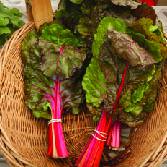Growing Herbs from Seed (General Instructions)
See chart for herb specific instructions
Growing herbs is easy whether you have the space for a formal herb garden, some pots on a sunny balcony or patio, or a tray in the window of your kitchen. Here are some easy planting instructions that will ensure the best results.
Select the pot(s) for your seeds. The pots can be as small as 3" in diameter and they can vary greatly in style (plastic, terra cotta, etc.). The pots need to have drainage holes. Planting trays can also be used.
Soak the seeds between two damp paper towel sheets for 2-4 hours before planting.
Prepare your potting medium. It can be a finely textured humus or compost or grow mix. Put approximately 4 cups of the medium in a plastic bag. Add 1 1/2 cups of room temperature water. Close the top of the plastic bag tightly and squeeze the moistened grow mix to help it absorb the water thoroughly. Put the moistened medium into the growing containers.
·Make a shallow furrow with a pencil. For small seed, the furrow should be 1/4 inch deep, and for tiny seed, the furrow should be 1/8 inch deep.
·For tiny seeds, use 10-20 seeds per container. Tiny seeds may be too small to break through a layer of soil, so they should not be covered. Cover the pot with a sheet of clear plastic to help keep moisture in and a consistent temperature.
·For medium sized and larger seeds, place 3-5 seeds in the furrow and sprinkle dry potting medium evenly over the seeds. A good rule of thumb is to cover the seeds to twice their thickness. Cover the container with a sheet of plastic.
·Soil must be kept moist but not overly wet. Place the pots in a tray and add lukewarm water to the tray and allow the pots to soak up the water. Do not keep the trays permanently filled as the pots will soak up too much water. Misting from a water bottle is also recommended for herb seedlings.
·Keep the pots out of direct sunlight until the seeds begin sprouting, and then remove the plastic covering.
·Once seedlings are growing, move the containers to a window or under lights. Herb seeedlings require at least 6-8 hours of sunlight every day. Pots must be placed in a sunny window sill or they must have a fluorescent light that they can set up to shine on the herbs for at least 8 hours a day. Herbs need consistent temperatures of 70°.
·Thinning is necessary to allow the plants to grow to well. Use scissors to trim the seedlings at soil level instead of pulling out by the roots.
·A water soluble fertilizer is recommended for herbs. Use 1/4 tsp of starter fertilizer for 1 gallon of water and fill the water trays with the weak fertilizer solution. Feeding the herb seedling every 2 weeks is recommended.
·Transplanting may take place to either larger containers to keep on a patio or window sill or outdoors to a garden area or flower bed. If transplanting outdoors, herb plants need to be slowly acclimated to the new environment. For the first day, place pots outdoors in a partially sunny place free from winds. Leave the pots out for several hours and bring back inside before night. Continue this routine over the next 4 days extending the time each day. Keep a close check on the moisture as the pots will dry out more quickly outdoors.
Enjoy your herb plants!
Care and Maintenance For Herbs
- Angelica
- Arugula
- Basil
- Borage
- Catnip
- Chamomile
- Chervil
- Chives
- Cilantro
- Cornsalad
- Cumin
- Dill
- Fennel
- Fenugreek
- Hyssop
- Lavender
- Lemonbalm
- Marjoram
- Marshmallow
- Milkthistle
- Oregano
- Purslane
- Rosemary
- Sage
- Sorrel
- Spearmint
- Summersavory
- Swisschard
- Tarragon
- Thyme
- Valerian
- Wormwood
- Valerian
- Wormwood
- Caper
- Mugwort
- Artichoke
- Okra
- Perilla
| Herb | Seeds/Ounce |
Ideal Temperature for Germination |
No. of Days for Germination |
Special Planting Instructions |
|---|---|---|---|---|
| Anise | 6,000/ounce | 70° | 15 days | |
| Arugula | 14,000/ounce | 70° | 10 days | |
| Basil, Thai Queen | 20,000/ounce | 65° | 10 days | |
| Basil, Italian Genovese) | 10,000/ounce | 65° | 10 days | |
| Basil, Cinnamon | 18,000/ounce | 65° | 10 days | |
| Basil, Dark Opal | 14,000/ounce | 65° | 10 days | |
| Basil, Lemon | 25,000/ounce | 65° | 10 days | |
| Borage | 1,500/ounce | 60° -65° | 20 days | Do not cover seeds after sowing in indented rows. Dark will help germination |
| Caraway | 10,000/ounce | 65° | 15 days | Cover seeds lightly after sowing. Darkness will help germination. |
| Catnip | 35,000/ounce | 60° | 10 days | Cover seeds lightly after sowing. Darkness will help germination. |
| Chamomile, Roman | 150,000/ounce | 65° | 10 days | |
| Chamomile, German | 200,000/ounce | 65° | 10 days | |
| Chives | 25,000ounce | 70° | 10 days | Darkness will help germination. |
| Chives, Garlic | 8,000/ounce | 70° | 10 days | Darkness will help germination. |
| Cilantro | 2,000/ounce | 60° | 10-12 days | Cover seeds lightly after sowing. Darkness will help germination. |
| Dill | 10,000/ounce | 60° -65° | 15 days | |
| Echinacea Purpurea | 7,000/ounce | 65° | 15 days | |
| Fennel | 4,000/ounce | 65° | 10 days | Cover seeds lightly after sowing. Darkness will help germination. |
| Lavender, English Hidcote Blue Munstead | 25,000/ouce | 60° | 30 days | Freeze seed 7 days before sowing. |
| Marjoram | 100,000/ounce | 60° | 25 days | Cover seeds lightly after sowing. Darkness will help germination. |
| Oregano | 125,000/ounce | 65° | 15 days | |
| Parsley | 10,000/ounce | 75° -80° | 15 days | Freeze seed 3- 5 days. Soak in warm water for 3-5 days before sowing. Cover lightly with media and cover flat with black plastic. Need darkness to germinate. |
| Rosemary | 20,000/ounce | 75° | Freeze seed 3-5 days before sowing. Cover seeds lightly. Darkness will help in germination. | |
| Sage | 3,000/ounce | 65° | 15 days | Freeze seed 3-5 days before sowing. Cover seeds lightly. Darkness will help in germination. |
| Summer Savory | 50,000/ounce | 65° -70° | 10 days | |
| Spearmint | 470,000/ounce | 60° -65° | 15 days | |
| Stevia | ||||
| Thyme | 70° | 12 days | ||
| Yarrow | 100,000/ounce | 70° | 10 days |































